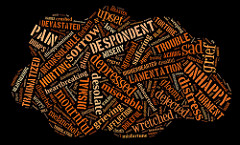One of the conditions in modern societies that often contributes to stress and anxieties is feeling insecure, threatened, or unsafe. There are many other factors to stress, anxiety and emotional disturbances. But, I want to address issues close to my heart; intrapsychic safety and security. I want to specifically address feeling unsafe and insecure.
Feeling unsafe intrapsychically will inevitably convert to maladaptive behaviours and compulsivity. Feeling insecure intrapsychically often lead to a lack of confidence in one’s own abilities and skills and distrustful of others, and the world.
 Generally, feelings are my friend, and I have made acquaintances with almost all of my emotions. I had come to accept feelings and emotions as a part of my experiences to be felt. I had embraced and incorporated feelings and emotions within my being. I have also allowed myself to mindfully and consciously express the feeling felt. I had even released inherited, trapped and preconception emotions, as well as unblocking heart-wall emotions. I had healed compound and post-traumatic emotional reverberation too. But, as an empath, I had learned the hard way how my feelings can still affect me, and most importantly, how other people’s emotions also impacted me. I had occasionally absorbed other people’s emotional resonances, and I had allowed that to affect me.
Generally, feelings are my friend, and I have made acquaintances with almost all of my emotions. I had come to accept feelings and emotions as a part of my experiences to be felt. I had embraced and incorporated feelings and emotions within my being. I have also allowed myself to mindfully and consciously express the feeling felt. I had even released inherited, trapped and preconception emotions, as well as unblocking heart-wall emotions. I had healed compound and post-traumatic emotional reverberation too. But, as an empath, I had learned the hard way how my feelings can still affect me, and most importantly, how other people’s emotions also impacted me. I had occasionally absorbed other people’s emotional resonances, and I had allowed that to affect me.
 Feeling unsafe and insecure are intrapsychic emotions. They are the core woundings from a less than ideal early environment in childhood. But, we do not have to let the past define the present or the future. These feelings often stemmed from inconsistency, chaotic and dismissive attachment patterns from our caregivers. But, they are not to blame because they too were the victim of their core woundings.
Feeling unsafe and insecure are intrapsychic emotions. They are the core woundings from a less than ideal early environment in childhood. But, we do not have to let the past define the present or the future. These feelings often stemmed from inconsistency, chaotic and dismissive attachment patterns from our caregivers. But, they are not to blame because they too were the victim of their core woundings.
Feeling unsafe arises when our external environment was hostile and threatening. A child may feel unsafe when their sense of self is physically or emotionally threatened. A child will also feel unsafe, lonely and abandoned when the caregiver is absent or when she is left alone for an extended period. If there is no one to mirror our being, we can lose sight of our beingness. The experiences can trigger body-memory retention, and their physiological response is usually a hypersensitivity to threats in the exterior world. Their fight/flight/freeze response is constantly on the alert and they are hypervigilant to fearful arousal. Imagine the toll this has on the body when it is permanently on alert.
 Feeling insecure, succeed feeling unsafe. When feeling insecure, a child feels awkward and inadequate in their abilities, skills and resources. The child lacks confidence, have doubts and distrusts themself, others and the world. Thus, the child will grow up to seek validation from the exterior world, thinking it would soothe their inner sanctum. When we are insecure about ourselves, we compensate for the lacking by constantly looking for ways to feel safe and secure. We also compensate by avoiding situations or people, and we may become controlling, adopting perfectionistic traits, or have obsessive-compulsive behaviours. We will often look for what is missing within outside of ourselves. We do this by collecting (material) things, including having people around us that makes us feel good. Unfortunately, we will not fully soothe that void looking externally when our intrapsychic world is unsafe.
Feeling insecure, succeed feeling unsafe. When feeling insecure, a child feels awkward and inadequate in their abilities, skills and resources. The child lacks confidence, have doubts and distrusts themself, others and the world. Thus, the child will grow up to seek validation from the exterior world, thinking it would soothe their inner sanctum. When we are insecure about ourselves, we compensate for the lacking by constantly looking for ways to feel safe and secure. We also compensate by avoiding situations or people, and we may become controlling, adopting perfectionistic traits, or have obsessive-compulsive behaviours. We will often look for what is missing within outside of ourselves. We do this by collecting (material) things, including having people around us that makes us feel good. Unfortunately, we will not fully soothe that void looking externally when our intrapsychic world is unsafe.
When I feel unsafe going someplace new, I used to make sure that I was early to the event. I would make sure that I arrived at least half an hour before the meeting to have time to settle down and relaxed. This behaviour allows me to feel like I was in control and it was a way of alleviating the discomfort, rather than looking at what was the cause. My strategy was to find ways to have control of situations or events. It was a strategy that worked for a time. Eventually, I had to look within to self-soothe.
In the perpetual cycle of self-fulling prophecy, a person seeks ways to feel safe and secure when feeling unsafe and insecure. However, you can find a way to self-soothe and settle the insecurity within the psyche. Here’s the good news. There are ways in which you can help yourself.
Here are some of the tools and techniques to help you build confidence, esteem and worth. They worked for me and I hope that they work for you too.
- Make time for Self-care
 Always put yourself first, you matter the most! This is not a selfish thought, but rather a self-care process. You have to look after number one (YOU). You have to move past caring for others first. Undoubtedly, we were conditioned to be considered, to be nice, to be kind to others. We were told to think of others, to be helpful and to be thoughtful of others. We were taught to believe that it matters what others think about us. But, in so doing, we neglected our own needs and care. I certainly thought that if I was helpful, nice and kind, somehow, I would feel safe in being altruistic.
Always put yourself first, you matter the most! This is not a selfish thought, but rather a self-care process. You have to look after number one (YOU). You have to move past caring for others first. Undoubtedly, we were conditioned to be considered, to be nice, to be kind to others. We were told to think of others, to be helpful and to be thoughtful of others. We were taught to believe that it matters what others think about us. But, in so doing, we neglected our own needs and care. I certainly thought that if I was helpful, nice and kind, somehow, I would feel safe in being altruistic.
However, it is more important that you treat yourself kindly through self-care rituals than being concerned with other’s people opinions. Self-care ritual is not simply just taking care of yourself physically, but also mentally too. Self-care mental constructs include positive words of affirmation for yourself, have compassion for mistakes of past events, and forgive yourself. For example, I have positive confirmations post-it notes all around the house to remind me of the positive qualities such as “I am safe!”, “I am comfortable in my skin!” etc.
- Stop making excuses and start doing
 When our external world is unsafe, we introspect and come to believe that our inner world is too. As we continue to think this way, we start to look for ways to feel safe and be safe. We tend to see threats when there are none. We make excuses for people, things and situations to minimise the threat, which may be imaginary. We may make excuses to change our behaviours and our mindsets because we are complacent in the familiar. This can keep us stuck in hypervigilant behaviours.
When our external world is unsafe, we introspect and come to believe that our inner world is too. As we continue to think this way, we start to look for ways to feel safe and be safe. We tend to see threats when there are none. We make excuses for people, things and situations to minimise the threat, which may be imaginary. We may make excuses to change our behaviours and our mindsets because we are complacent in the familiar. This can keep us stuck in hypervigilant behaviours.
Change is inevitable and we should embrace it. If you have a resistance to change, start with something small. Perhaps begin with a small change of routine, such as change the direction to work. Walk on a different side of the road! When we start to take these small steps to change it gets easier.
- Reframe the way you think
 What we think, we will manifest because it was impressed in the mind. If you think that you are not safe, lacking in confidence or not worthy you are essentially broadcasting this unconsciously. We don’t consciously mean to send out these unconscious perceptions but we do, and we project it.
What we think, we will manifest because it was impressed in the mind. If you think that you are not safe, lacking in confidence or not worthy you are essentially broadcasting this unconsciously. We don’t consciously mean to send out these unconscious perceptions but we do, and we project it.
Have you ever experience discomfort or uneasiness in a situation with someone and you don’t know why? It is possible that that person had unconsciously broadcast messages to your unconsciousness. You cannot see it but it is there. Just like the radiowaves being broadcasted from a radio station, you cannot see the radio wave but it is there nonetheless.
Reframing your thinking style simply means reverting the way you think. If you tend to be pessimistic, revert this to be optimistic. It is simply about changing your automatic thoughts and make them conscious. You will need to watch what you think to reframe your thoughts. If you often find yourself saying that you cannot do something, change this to you can! It is about fake it until you make it.
- Remind yourself that you are loved
 When we feel unsafe, threatened or insecure it is often because the love is not there. Our feelings begin internally as a result of an external stimulus that we introject, but we could also be absorbing other’s people energy and emotion, unconsciously. We can protect ourselves and keep safe by reminding ourselves that we are loved. We are loved by God. We are loved by the Higher Power. We are loved and we can draw power from the universe to recharge our battery, just as we recharge our body through grounding.
When we feel unsafe, threatened or insecure it is often because the love is not there. Our feelings begin internally as a result of an external stimulus that we introject, but we could also be absorbing other’s people energy and emotion, unconsciously. We can protect ourselves and keep safe by reminding ourselves that we are loved. We are loved by God. We are loved by the Higher Power. We are loved and we can draw power from the universe to recharge our battery, just as we recharge our body through grounding.
We simply need to visualise ourselves being loved, imagine feeling loved, feeling protected and feeling safe within the loving embrace. Try it, find a quiet place, be still and silent. Close your eyes and imagine feeling loved. Even if you have not experienced love in your reality, you can still imagine what it would be like to have loving feelings for yourself. It might help to think about what you love, to experience loving feelings.
I love my inner child! I imagine her face, the innocent, the bright eyes and I recalled other special features to help me feel that love. It might help if you have a photo of the child that you were. Really see her/him. Feel the love for her/him. Take as long as you need. You will know the experience of love when tears well up in your eyes. It might take some practising especially if your experiences of love was absent or hostile or if you are not connected to the essence of your inner child.
Once you have experienced love for yourself, you can emit and project that love towards others. Then wait, watch and see that love returned to you. According to the Universal Law of Attraction, what we give out, we will attract.
With faith, hope and trust, you too can find your safety and security intrapsychically within your inner world. If you hold love and positive intention within your heart, you will receive what you give out.
Do you find this blog helpful? If you like this post, I love to hear from you on my Twitter Page.




 A stressful situation for one person will inevitably be different. People are divergent and will have a different way to view or manage problems. From our lived experiences, these individuals can often draw upon their internal resources to cope with stress. However, it does not mean that you can’t learn to build your inner strength.
A stressful situation for one person will inevitably be different. People are divergent and will have a different way to view or manage problems. From our lived experiences, these individuals can often draw upon their internal resources to cope with stress. However, it does not mean that you can’t learn to build your inner strength. How we think and react can create or break the situation into a stressful or stress-free one. There are three main types of stress; acute, episodic and chronic. I shall now review the different kinds of stress in more details.
How we think and react can create or break the situation into a stressful or stress-free one. There are three main types of stress; acute, episodic and chronic. I shall now review the different kinds of stress in more details. Knowing your trigger will help you notice your stress pattern. Knowing this fact may be helpful to master your internal emotional reaction in a stressful situation. Knowing is an acknowledgement or awareness of what was previously elusive to you. It is about being conscious of what was unconscious about you.
Knowing your trigger will help you notice your stress pattern. Knowing this fact may be helpful to master your internal emotional reaction in a stressful situation. Knowing is an acknowledgement or awareness of what was previously elusive to you. It is about being conscious of what was unconscious about you. Knowing what you think about will help you make sense of your inner voice. Listening to what you say and how you talk to yourself in a stressful situation will help you become in control of the situation, rather than allowing the problem to control you. We are often overly critical of ourselves. We can be the harshest critique. But, if we can be compassionate and kinder to ourselves, we can be free of the thoughts and let them go easier.
Knowing what you think about will help you make sense of your inner voice. Listening to what you say and how you talk to yourself in a stressful situation will help you become in control of the situation, rather than allowing the problem to control you. We are often overly critical of ourselves. We can be the harshest critique. But, if we can be compassionate and kinder to ourselves, we can be free of the thoughts and let them go easier. Now, try learning to speak to yourself differently. If you used to shout at yourself internally, why not try speaking softly this time. Hopefully, you will notice that the impact is dramatically reduced. You may start to notice an alternate feeling associated with the gentle inner voice. You also may hear yourself speaking using contrasting words, kinder and loving expression. The change begins with small and enlarges, like a ripple.
Now, try learning to speak to yourself differently. If you used to shout at yourself internally, why not try speaking softly this time. Hopefully, you will notice that the impact is dramatically reduced. You may start to notice an alternate feeling associated with the gentle inner voice. You also may hear yourself speaking using contrasting words, kinder and loving expression. The change begins with small and enlarges, like a ripple.
 Sleep is
Sleep is  During the nocturnal hours, your body’s naturally crave sleep because your internal biological clock or the circadian rhythm is synchronised with the day/night cycle of the diurnal rhythm. The
During the nocturnal hours, your body’s naturally crave sleep because your internal biological clock or the circadian rhythm is synchronised with the day/night cycle of the diurnal rhythm. The  Have a goal in mind for your bedtime (sleep time). This is a time that you want to be in bed, lights out, eyes shut and breathing easily.
Have a goal in mind for your bedtime (sleep time). This is a time that you want to be in bed, lights out, eyes shut and breathing easily. I firmly believe that rituals are helpful. Have a bedtime routine and pattern that you stick to help you build a structure around your sleeping habit. I cannot stress the importance of sticking to your routines and think positively about enjoying the mundane.
I firmly believe that rituals are helpful. Have a bedtime routine and pattern that you stick to help you build a structure around your sleeping habit. I cannot stress the importance of sticking to your routines and think positively about enjoying the mundane. I give myself around 10-15 minutes for relaxation. In that time, I may mediate or listen to soothing, relaxing music to ease myself to sleep. You might find my
I give myself around 10-15 minutes for relaxation. In that time, I may mediate or listen to soothing, relaxing music to ease myself to sleep. You might find my  By 23.00, lights out for me, regardless of whether my husband or I am ready. I turned off the light.
By 23.00, lights out for me, regardless of whether my husband or I am ready. I turned off the light.
 There are many examples of self-care, including regular exercise, eating well, getting enough sleep, be in nature and taking frequent breaks or rest. But, it might help to think of self-care as a fun part of your daily ritual, rather than something you are compelled to do, like a chore. I emphasise fun and playful activities that you enjoy on a daily basis because sometimes we think of self-care only periodically.
There are many examples of self-care, including regular exercise, eating well, getting enough sleep, be in nature and taking frequent breaks or rest. But, it might help to think of self-care as a fun part of your daily ritual, rather than something you are compelled to do, like a chore. I emphasise fun and playful activities that you enjoy on a daily basis because sometimes we think of self-care only periodically. The mind never sleeps. The conscious mind is continually evaluating the input from our senses. The unconscious mind never shut off because it automates body regulatory, circuitry systems, such as keeping a steady sinus rhythm. Meditation is a state of being still in the body so that you can go within the psyche to observe thoughts, listen to what you are thinking about and notice comes up for you when cognitively being aware of what is in your mind. What you think you will manifest. Be sure to think only positive thoughts.
The mind never sleeps. The conscious mind is continually evaluating the input from our senses. The unconscious mind never shut off because it automates body regulatory, circuitry systems, such as keeping a steady sinus rhythm. Meditation is a state of being still in the body so that you can go within the psyche to observe thoughts, listen to what you are thinking about and notice comes up for you when cognitively being aware of what is in your mind. What you think you will manifest. Be sure to think only positive thoughts. A loving act for me includes feeling joyful, having fun and laughing at myself, lovingly. It is ultimately a knowing that you embrace with heart and soul. It is enough to say things like; I love my hair today, I love how I handle that argument today, I love the way I spoke my truth, even though not everyone agreed. It is quite alright to say; I love my voice, I love my flaws, etc. Whatever you dislike about yourself, try to reverberate your thoughts by expressing and vocalising your love, out loud.
A loving act for me includes feeling joyful, having fun and laughing at myself, lovingly. It is ultimately a knowing that you embrace with heart and soul. It is enough to say things like; I love my hair today, I love how I handle that argument today, I love the way I spoke my truth, even though not everyone agreed. It is quite alright to say; I love my voice, I love my flaws, etc. Whatever you dislike about yourself, try to reverberate your thoughts by expressing and vocalising your love, out loud. I want to discuss the concept of masking in Psychology further.
I want to discuss the concept of masking in Psychology further. Fear not, I can offer some helpful tips to those individuals who’d like to remove their (psychological) masks – but keep the COVID-19 cover on (for now). Here’s how:
Fear not, I can offer some helpful tips to those individuals who’d like to remove their (psychological) masks – but keep the COVID-19 cover on (for now). Here’s how: